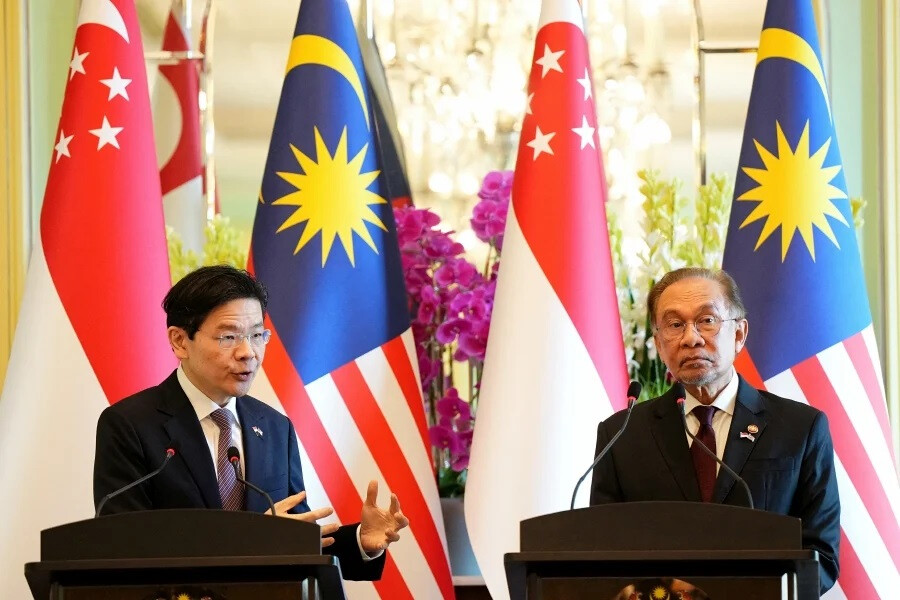
Singapore – Singaporean Prime Minister Lawrence Wong has affirmed the nation's commitment to working closely with Malaysia and other ASEAN partners to deepen regional economic integration and foster constructive relationships with global trade partners.
Prime Minister Wong conveyed this message in a Facebook post late on April 4th, a statement that follows closely on the heels of an announcement by the U.S. President regarding the imposition of broad tariffs on all goods imported into the United States.
The Prime Minister's post came after a phone call with Malaysian Prime Minister Anwar Ibrahim, during which he extended Hari Raya Aidilfitri greetings. He noted that it had been a somber week, marked by significant regional and international developments amidst the ongoing festive celebrations.
"In these uncertain times, it is all the more crucial that Singapore, Malaysia, and our ASEAN neighbours strengthen our cooperation and solidarity," Prime Minister Wong emphasized in his post.
"Prime Minister Anwar and I discussed the humanitarian situation in Myanmar following the devastating earthquake last week. We also exchanged views on the recent US tariffs."
Prime Minister Wong further stated his anticipation for meeting Prime Minister Anwar in person at the upcoming ASEAN Summit in Kuala Lumpur in May to continue their discussions.
Analysis:
The U.S. President's proposed import tariff policy introduces a significant element of uncertainty into the global trade landscape. ASEAN nations, many of which possess export-oriented economies, are particularly vulnerable to shifts in U.S. trade policy. In response to this evolving situation, Singapore, along with Malaysia and other ASEAN member states, are likely to prioritize the strengthening of intra-regional economic ties and the development of collective strategies to mitigate potential adverse impacts.
The Association of Southeast Asian Nations (ASEAN) has been actively pursuing economic integration through the ASEAN Economic Community (AEC), which aims to achieve greater liberalization of trade in goods, services, and investment within the region. However, the integration process faces ongoing challenges, including disparities in economic development levels among member states, non-tariff barriers to trade, and regional political complexities. Singapore and Malaysia, as two of the more developed economies within ASEAN, play a pivotal role in driving the economic integration agenda and fostering greater regional cooperation for mutual benefit.
The humanitarian crisis in Myanmar, exacerbated by the recent earthquake in the context of ongoing political instability following the military coup, remains a significant concern for ASEAN. The regional bloc faces the challenge of addressing the crisis effectively, providing humanitarian assistance, and encouraging a peaceful and inclusive resolution to the internal conflict.
The bilateral relationship between Singapore and Malaysia is of paramount importance in the context of ASEAN cooperation. The two neighbouring nations share deep economic linkages and collaborate extensively across various sectors, including trade, investment, and tourism. Their continued close cooperation is crucial for advancing ASEAN's economic integration goals and addressing shared regional challenges.
Prime Minister Wong's statement underscores Singapore's proactive stance in navigating global economic uncertainties by reinforcing its commitment to regional partnerships. His discussions with Malaysian Prime Minister Anwar Ibrahim highlight the immediate concerns surrounding potential U.S. tariffs and the humanitarian situation in Myanmar. The anticipation of further discussions at the upcoming ASEAN Summit signals a concerted effort among regional leaders to forge a coordinated response to these pressing issues and to further solidify the economic bonds within ASEAN. The focus on deepening economic integration with Malaysia and ASEAN reflects a strategic move to build resilience and foster shared prosperity in an increasingly complex global environment.
[Copyright (c) Global Economic Times. All Rights Reserved.]






























